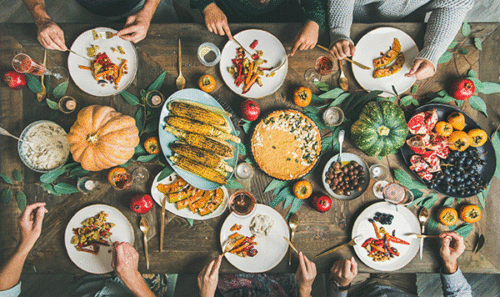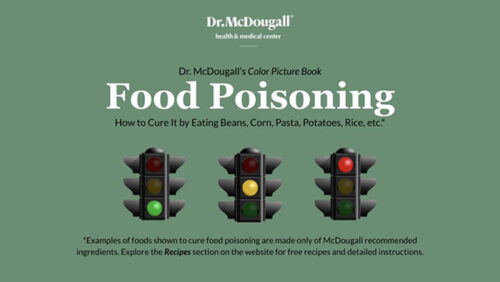Are You a Sickly Vegetarian (Vegan)?
You will often hear respectable dietitians and nutritionists warn that only well-planned vegetarian diets can be healthy. They talk about the importance of careful planning so you get all of your protein, essential amino acids, calcium, zinc, omega-3 fats, and/or vitamin B12 by consulting a registered dietitian. Fortunately, if you follow my simple recommendations, which are to base your diet around unrefined starches with the addition of fresh or frozen fruits and vegetables (with the addition of supplemental B12 after 3 years or if pregnant or nursing) you cannot fail to achieve excellent nutrition. Coincidentally, this is also a pure vegetarian diet; commonly known as a vegan diet – with no animal products of any kind. But being vegan does not necessarily mean good health.
In 1977, I had the opportunity to become friends with my first vegan. Jeff served as an intern for me during our medical residency program in Hawaii. He was very strict with his principles, mainly because of his concern for the welfare of animals. Most people love animals and are abhorred when they hear of incidences of abuse. But few of these same caring people ever make the connection between the cows, chickens, pigs and fish on their plates and animal suffering.
Jeff was the purest of all vegans; he even wore nylon belts and plastic shoes in order to avoid leather products. Unfortunately, there was one animal he abused at every meal – the human animal, himself. His main sources of calories were Cokes and potato chips. This self-neglect showed – Jeff was overweight and greasy-skinned. My point is being a vegan often does not equate to good health. Let me tell you about four different kinds of vegans that are examples of poor health. (I have called these “boys,” but you can substitute “girls.”)
Doughboys:
Do you remember snitching raw cookie dough when your mother was baking? She told you that you would get worms from eating it. I don’t think that’s true, but I know all that white flour, sugar and shortening isn’t good for you – at the very least it can lead to obesity and poor health. There are high-fat and low-fat doughboys.
The high-fat doughboy loves vegan cookies and cakes. I was just sent a vegan cheesecake that was almost worth dying for (almost). Not a speck of any animal in these pure desserts, but they are made of sugar, flour and oil. They taste like the real thing – so soft, smooth, and chewy. The results in terms of health are almost like the “real thing” too.
The low-fat doughboys think they have the true path to good health – “If it is low-fat it must be health food.” As a result of this widespread belief, SnackWell’s Cookies and Entenmann’s Cakes are national best sellers (even though these 2 items are not vegan, there are some low-fat vegan cookies that fit this category). Unfortunately, these sugar and flour land mines are an extra 350 guilt-free calories daily added to an already overstuffed diet. These low-fat vegan foods are one of the reasons obesity is now affecting one-third of our population.
Lastly, there are those wino doughboys. They consume 600 to 1000 calories a night of no-cholesterol, very low-fat wine or other alcoholic beverage. These are mostly “empty calories” with almost no protein, vitamins, minerals, fats or fiber. Alcohol acts much like sugar in the body. These vegetarians will often admit that they have one glass of wine with dinner – but undoubtedly this is a 32 ounce glass they are drinking from.
Soy Boys:
In the summer of 1997 our McDougall Adventure took place on a small cruise ship on the Pacific coast of Costa Rica. For our first evening meal we had a picnic on the beach. For our first evening meal we had a picnic on the beach. After dinner a young man approached me, complaining he was feeling ill and did not think he could continue the trip. He gave me his history of liver failure caused by hepatitis from IV drug abuse several years before. I explained that the high protein content of the soy burgers and dogs was the culprit. His failing liver could not process all that protein. For the rest of the trip I helped him choose his foods, and he was so pleased that he told me that was the best he had felt in four years.
Soybeans are high fat (40%) and high protein (30%). When they are turned into “fake animal products” like soy burgers, hot dogs, luncheon meats, and pepperoni, their soy protein content can become as high as 70% of the calories. Soy yogurts and ice creams are high in fat and sugar, and soy cheeses are high fat. In addition, all of these foods have had the healthful carbohydrates, dietary fiber, vitamins and minerals processed out of them. These are not real foods anymore but synthetic analogs.
People who base their diet on these “fake meats” suffer from deficiencies (fiber, vitamins, potassium, carbohydrates), and excesses (fats, proteins, and sodium) of nutrients. Plus the proteins are phytochemicals that have pharmacological activities – like estrogen activity, and immune and thyroid gland suppression (See the September 2002 Newsletter at www.drmcdougall.com.). Commonly, soy boys are fat and sickly. What would you expect from synthetic food?
Greasy Boys:
Hardly a day goes by that someone fails to tell me the benefits of olive oil or flaxseed oil. They tell me that there are no essential omega-3 fats in many plant foods and as a result they have to consume these concentrated oils to stay alive. I sometimes hear these added oils also prevent heart disease, cancer, and hair loss. They even say they need oil to “oil” their joints. Fortunately, all the oil you need, including the essential omega-3 oils, is in the basic plant foods – starches, vegetables and fruits. In fact, only plants can synthesize these essential oils – and all plants do so in amounts sufficient to provide for our needs. When these oils are consumed in the plant part (leaf, root, stem, fruit, etc.) they are combined with other stabilizing and protective substances, such as antioxidants, vitamins, minerals, fibers, phytate and other phytochemicals — that allow the oils to work properly and safely within your body.
There are no “free” oils in nature. All olive, corn, flaxseed, and safflower oil must be processed from their native fruit or seed before being poured into the bottle. This processing leaves behind the protective ingredients. Now the oils are medicines at best, and toxic at worst. Plus all that fat makes people fat and ends up on their hair and skin making them look greasy. (You can read much more about vegetable oils on my web site www.drmcdougall.com, under “Vegetable Fat as Medicine.”)
Raw Boys:
Recently we spoke at a Christian-oriented women’s health conference, where the underlying belief of the event’s promoters was the best diet is one of mostly raw foods. The idea was that cooking destroys the nutritional value of the foods. There is always a little truth in every message – cooking does this, but the minor loss is unimportant, because of the overabundance of nutrients in plant foods.
Strict “raw fooders” avoid all cooked food. So what’s left to eat? You can’t eat raw rice, beans, soybeans, or wheat flour. Raw potatoes are possible to eat, but not too tasty. Some grains can be sprouted and they would fit the raw philosophy, but that might take planning days ahead of time. What is left for people who say they eat a raw food diet is sugar (fruits and juices) and fat (nuts, seeds, and avocados). The result is that people easily gain weight.
Then there are a few purists, who really do eat mostly healthy green and yellow vegetables – broccoli, cauliflower, pea pods, lettuce, and sprouts; and fruits. However, when this is their diet, they soon become very thin from lack of calories. Few people can maintain themselves on foods which are so dilute in calories, so in order to survive comfortably they pour oil all over their salads. The result is a high fat diet – with a large proportion of free oils.
A Well-Planned Vegan Diet:
There must be a diet for people which allows us to look, feel and function our best. A diet where the foods match perfectly the size of the stomach, our hunger drive, and our activity level. So that when we exercise more, our hunger drive increases and we correctly take in the right number of calories to meet those increased energy needs – and our weight stays at the same ideal level. Our Creator would not have been so unkind or so incompetent to fail to make us right, so that our environment properly supports us.
The problem we face, as you may have learned in Bible school, is we have choices. The wrong choices in foods make everything wrong: More to the point, we become fat and sick when we satisfy our natural hunger drive. However, the right choices make life easy. The diet intended for people is a properly designed vegan diet – centered on delicious starches with fruits and vegetables.
Does it have to be pure vegan to maintain excellent health?
No. The human body is a tower of strength, putting up with unthinkable abuses, like two packages of cigarettes, a half bottle of whiskey, and a fat-sugar filled diet – and it lives. So obviously, most people can tolerate a small amount of rich foods, like ice cream on their birthday, candy on Halloween, eggs on Easter, turkey on Thanksgiving and/or ham on Christmas. But consuming these feast foods every day makes people look and feel like aristocrats – the kings and queens of olden times – and we all know what they looked like! And more importantly, you should know what is the best – the most ideal diet for your good health – and then choose where you will take your risks, so you will be in control of your future.
Recommended Articles
Are You a Sickly Vegetarian (Vegan)?

Giving Thanks







